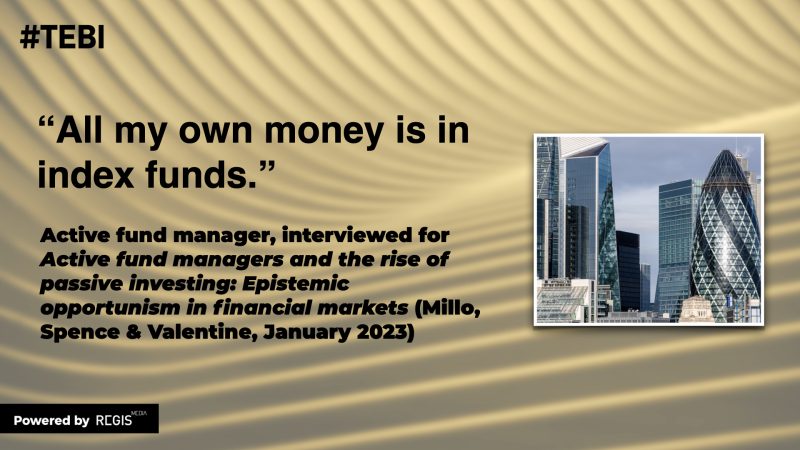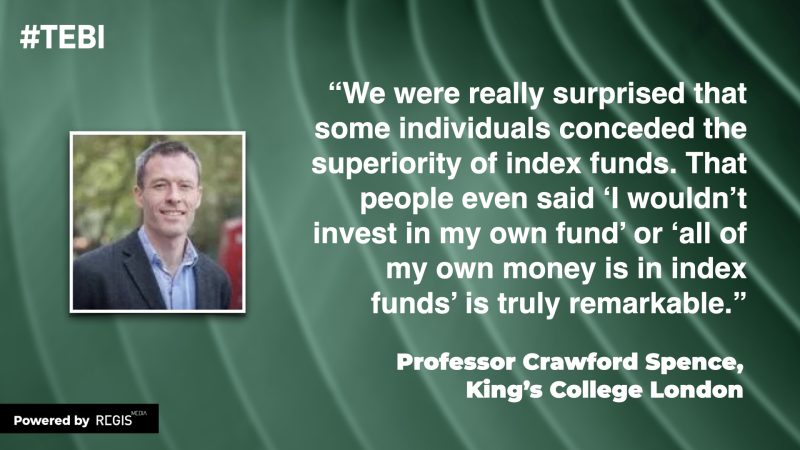
What do active fund managers really think of active management? And do they invest their own money in actively managed funds? The answers found in new research based on interviews with fund managers in London and the US may surprise you. As ROBIN POWELL explains, the researchers found a large degree of cognitive dissonance among the managers they spoke to.
Faced with the choice between changing one's mind and proving that there is no need to do so, the economist John Kenneth Galbraith once observed, almost everyone gets busy on the proof. That is certainly what appears to be happening in the active fund industry, according to a new study.
The case for active managers to go back to the drawing board is fairly irrefutable. It may not yet be facing an existential threat, but when a serious publication like the FT publishes an article with the headline , as it did last week, it is clear the industry has seen better days. Investors are turning in their droves to low-cost, passively managed funds that usually, in the long run, provide superior net returns.
The fund industry is a classic example of what organisational scientists call a community of practice (CoP). In a study published last July, a team led by Davide Nicolini at Warwick Business School showed how CoPs, when confronted by new developments they perceive as a threat, employ defensive strategies to protect themselves and to assert their authority. These strategies, it showed, tend to thwart learning and frustrate innovation.
Three defensive strategies
CoPs defend themselves, the paper argues, in three ways. First, they assert a strong identity, to try to rally previously disparate members of the community together by offering a renewed sense of purpose. Secondly, they seek to delegitimise the knowledge of those who aren’t in their group and establish boundaries between ‘us’ and ‘them’. Thirdly, they frame their area of expertise as inaccessible by anyone other than themselves.
A new study applies this theory to active management and shows how the fund industry is using all three strategies to defend its interests.
Yuval Millo, also from Warwick Business School, along with Crawford Spence from King’s College London and James Valentine from Marquette University in Wisconsin, conducted interviews with 69 senior people working in fund management in London, New York and Chicago.
The fund professionals were asked to talk in detail about the rise of passive investing, how it was impacting on their work, and whether it had altered their views on the role and prospects of active fund management.
Striking candour
Professor Spence says he was struck by how candid some of the interviewees were. “We were really surprised that some individuals conceded the superiority of index funds,” he says. “That people even said ‘I wouldn’t invest in my own fund’ is truly remarkable and indicative of high levels of reflection and honesty, at least among some fund managers and analysts.”
Some of those interviewed were highly critical of the active fund industry. “The amount of ignorance on the buy-side is mind blowing,” said one,” and that's one of the big reasons why I think there is no alpha generation happening (and) why the industry is moving towards passive. The industry (is) made up of very average people who just don't know what they are doing.”
A second interviewee described how a “top fund manager” was barely able to use a computer, still kept a paper diary, and insisted on his PA printing out a paper copy of any research he wanted to read.
“I don't see any reason why this trend towards passive management won’t continue,” said a third interviewee. “All my own money is in index funds.”

Cognitive dissonance
Yet despite this surprisingly downbeat assessment of active management the sample group gave them, the researchers also detected a large degree of cognitive dissonance.
For example, the same individual who admitted investing his own money entirely passively was asked why he was still motivated to be an active manager at all. “I get out of bed each morning thinking I have an incredibly interesting job,” he replied. “Because I can learn about China one day and Mexico the next and microfluidics the next day and aircraft engines the next day… and then debate things with smart people.”
The researchers also found that the professionals they interviewed were keen to give reasons for investors to continue using active funds. These arguments, however, were often “convoluted and self-serving” and ran counter to data and evidence.
For example, most of the interviews were conducted while markets were rising, and many of those questioned predicted that active managers would eventually prove their worth in a bear market. That turned out to be “hopeful fantasising”: when markets fell in 2020 and again in 2022, most active funds failed to beat their benchmarks.
Another argument is that investors have no choice but to use actively managed funds if they want to invest sustainably. This is despite the big passive managers having large corporate governance teams and the fact that their record on holding boards to account on ESG issues is actually slightly better than that of their active peers.
"Epistemic opportunism"
“We had to coin a new phrase here to capture what was going on (in these interviews),” says Professor Spence, “and we chose the term epistemic opportunism. This effectively means snatching at any explanation that portrays active fund management as superior. The ‘epistemic’ element is to do with knowledge: active managers still argue that their knowledge base and ways of investing are superior, even if they concede that they tend to underperform passive funds on the whole.”
The researchers conclude that “the active community is falling back on the well-established dispositions and practices of its actors, effectively fighting (the) threat (from index funds) with what prompted the rise of passive in the first place.” Its motive for doing so is to “re-establish meaning and purpose for the active investment community and resolve in some way any cognitive dissonance that active players are experiencing.”
What then of the future? Will active managers stop being so defensive and start addressing the underlying problems the industry faces?
“As long as they keep getting steady business, I don’t see this situation changing any time soon.” says Professor Spence. “Pressure needs to come from pension trustees and investment advisers, although I am perplexed as to why they are still so beholden to active fund management. That might be my next research project.”

© The Evidence-Based Investor MMXXIV. All rights reserved. Unauthorised use and/ or duplication of this material without express and written permission is strictly prohibited.
